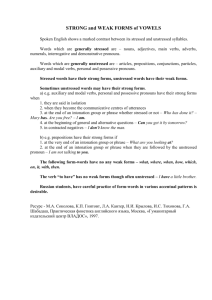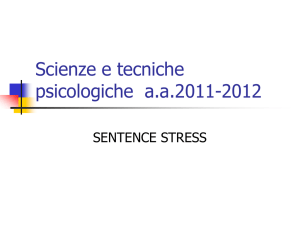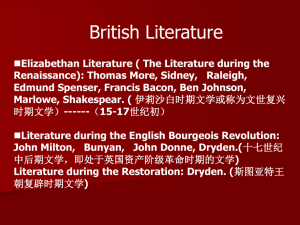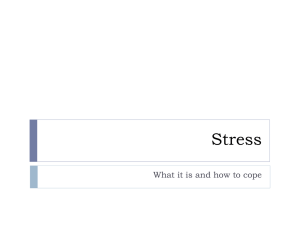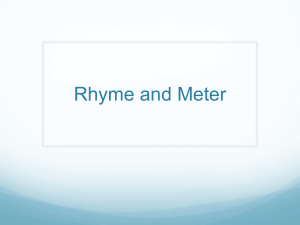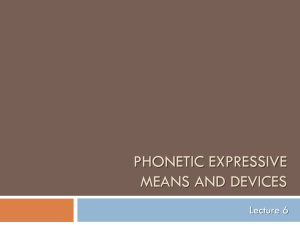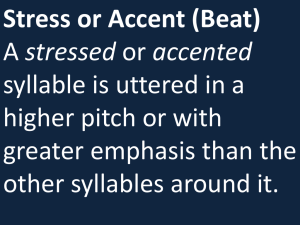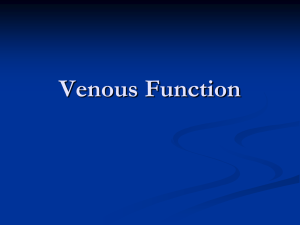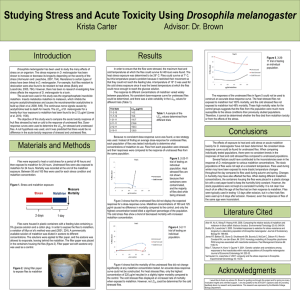L4 Sentence-Stress and Rhythm
advertisement
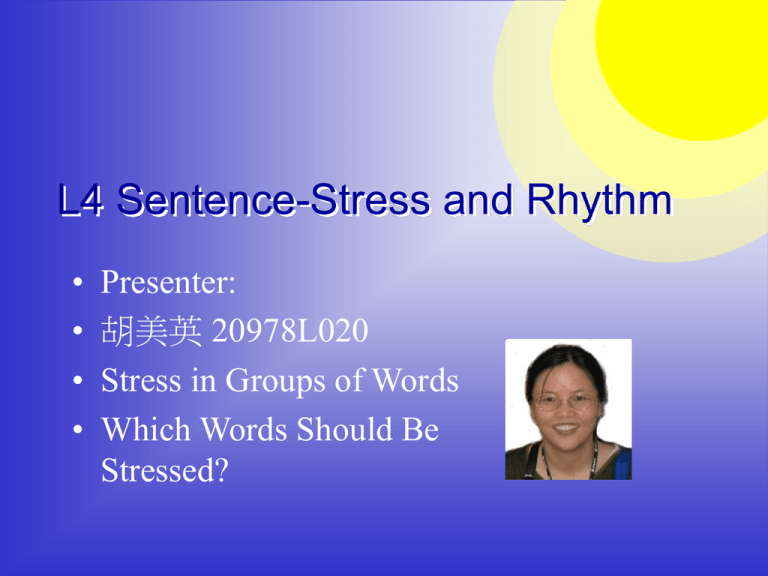
L4 Sentence-Stress and Rhythm • • • • Presenter: 胡美英 20978L020 Stress in Groups of Words Which Words Should Be Stressed? L4 Sentence-Stress and Rhythm 1. Stress in Groups of Words I Word-stress phrase-stress sentence-stress I am history noon in the after glad to see you. 1. Stress in Groups of Words II sentence stress a polysyllabic word the syllable that normally receives word stress I’ll meet you tomorrow . 1. Stress in Groups of Words III There is a great deal more difference between stressed and unstressed syllables in English than other languages sentence stress as well word stress 1. Stress in Groups of Words IV • Rhythm of many languages is mechanically regular, a series of bursts of sound all of about the same size and force, like the machine gun fire, such as Japanese, Spanish, Italian, Pilipino, Chinese … English pronounced with such a rhythm would probably not be understood. machine-gun fire vs. a series of family groups 1. Stress in Groups of Words V • In a language like French or Spanish, a line of poetry is usually determined by counting the total number of syllables, stressed and unstressed alike. • Lines containing the same number of syllables are felt to be of the same length.. 1. Stress in Groups of Words VI • Two lines from Tennyson “ Break, break, break, On thy cold gray stones, O sea!” The unstressed syllables are so unimportant rhythmically speaking, that it is not even necessary to count them. It may take as long to say the first as the second. 1. Stress in Groups of Words VII • A significant observation regarding English pronunciation ACCENTS TEND TO RECUR AT REGULAR INTERVALS. The more unstressed syllables there are between accents, the more rapidly (and indistinctly) those syllables are pronounced. Pronouncing the following two sentences: The boy is interested in enlarging his vocabulary. Great progress is made daily. 1. Crushing together the unstressed syllables of the first sentence to get them said in time. 2. How the stressed syllables of the second sentence are somewhat lengthened so as to compensate for the lack of intervening unstressed syllables. Figure 7 Examples of English sentence rhythm Five points to acquire a good English speech rhythm 1. Giving proper emphasis to stressed syllables, and making them recur rather regularly within a thought group. 2. Weakening unstressed words and syllables, and obscuring the vowels in most of them. 3. Organizing words properly into thought groups by means of pauses. 4. Blending the final sound of each word and syllable with the initial sound of the one following within the same thought group. 5. Fitting the entire sentence into a normal intonation pattern. II. Which Words Should Be Stressed? • In general, content words are stressed. • Function words are left unstressed. • Unless the speaker wishes to call special attention to them. Content words, usually stressed 1. Nouns. 2. Verbs (with the few exceptions listed under function words). 3. Adjectives. 4. Adverbs (including not and verbs contracted with not, such as don’t). 5. Demonstratives: this, that, these, those. 6. Interrogatives: who, when, why, and so on. Functions words, usually unstressed 1. Articles: a, an, the. 2. Simple prepositions: to, of, in, and so on. 3. Personal pronouns: I, me, he, him, it, and so on. 4. Possessive adjectives: my, his, your, and so on. 5. Relative pronouns: who, that, which, and so on. Functions words, usually unstressed 6. Common conjunctions: and, but, that, as, if, and so on. 7. One used as a noun-substitute, as in the red dress and the blue one. 8. Verbs may be used as auxiliaries: be, have, do, will, would, shall, should, can, could, may, might, and must. Auxiliaries -examples • He is resigning. Do you see it? We must wait. Principal verb • Harry is my best friend. • Barbara has a lovely smile. At the end of a sentence • I thought he was smarter than he is. • All movies aren’t made in Hollywood, are they? Tag question Compounds • Compound nouns with or without a hyphen , or written as two separate words– are accented on the first of the two words and receive sentence-stress. bird’s-nest, drugstore, an apartment house, business of fairs, a social worker Nominal Compounds • With a special meaning, rather than as a sequence of independent words. a noun • She’s a social worker – she makes her living by helping people solve social an exception problems. • She’s a social worker – she is a worker who enjoys social relationships with other people. Differing in Sentence Stress, Differing in Meaning 1. It’s a gold gold) . watch (the watch is made of 2. It’s an apple apple) . pie (the pie is made of 1. It’s a metal cutter (it cuts metals) . 2. It’s an Metal Cutter (the cutter is made of metal) . Two-word Verbs • Normally, the adverb receives sentencestress. E.g. to split up, to put on • Confusion: to look at him, to listen to him. • Distinction: 1. What are you putting on? 2. What are you looking at? 3. At what are you looking? ‘don’t’ stressed? Venture not stressed? Majority of Cases 1. I don’t imagine you turn cannot suc ceed in a stressed? be not bustressed? siness venture. ready to turn over to you. 3. This red rose is to be planted here. 4. He eats three full meals each day. ‘doesn’t’ stressed? 5. I shall deliver it to you. 6. She says that she likes the apartment, doesn’t she? ‘this’ stressed? 2. In an hour it will be Violations – Reason One 1. Calling special attention to a word by placing contrastive stress on it. E.g. I don’t imagine you can succeed in a business venture. Wishing to suggesting that you cannot succeed in a business venture though perhaps someone else could. Violation –Reason Two 2. Giving the sentence a more regular rhythm. One stressed syllable is usually separated from the next by one, two, or three unstressed syllables. 4. He eats three full meals each day. 5. I shall deliver it to you. Function word, to, is stressed The original regular stresses contain six successive stressed syllables. Violations • Students of English should not, however, allow these unusual stresses they may occasionally notice to confuse them and lead them to distribute stresses randomly. The Basic Principles • Content words are stressed. • Function words are unstressed. • Auxiliaries verbs, personal pronouns, and possessive adjectives are function words and should not be stressed. • I and my are not as important as we sometimes think. L4 Sentence-Stress and Rhythm • The end of my presentation • Next presenter • 黃宜茹 20978L019


